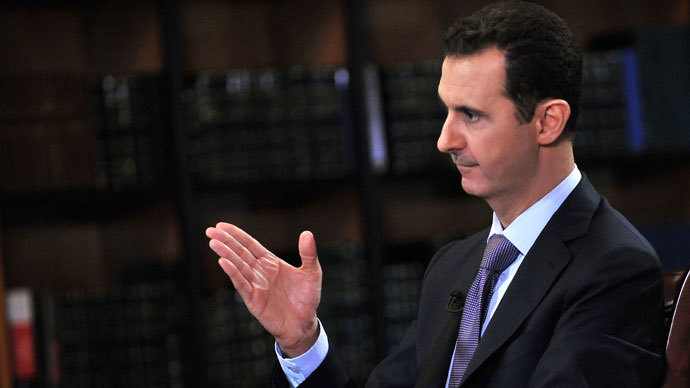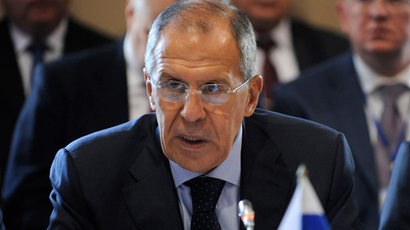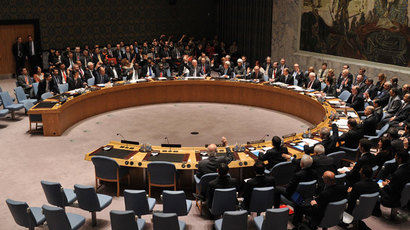I obey the will of Syrian people, not a particular group – Assad

If quitting the post could really somehow improve the situation in Syria, President Assad says he would not hesitate to resign. But he is not ready to leave the country during a time of crisis unless the majority of Syrians tell him to.
“You don't quit your position and leave your country in the
middle of the storm,” Syria’s President Bashar Assad said in
an interview with the Italian Rai News TV channel on Sunday.
“Your mission is to take your country to the shore, not to
abandon the ship and the Syrian people.”
‘Self-evident’ aim to cooperate
Assad stressed Syria’s willingness to eliminate chemical weapons in the country, saying that Syria has no reservations on this issue.
On Friday the UN unanimously passed a resolution which outlines the details of taking under international control and ultimately destroying Syria’s chemical arsenal by mid-2014.
The President said it is “self-evident” that the government will ensure security to the UN team, which will be responsible for the dismantling process, adding however that terrorists might undermine the efforts.
“Of course our role is to offer the data and to facilitate their procedures, which is available so far. But I think it's about the technical side or aspect of the implementation, about how to reach those places, especially when you have terrorists who could put any obstacle, and about how to dismantle and get rid of those materials,” Assad said.

In the interview Assad pointed out that his government is ready for political dialogue with the opposition that has “a political program, a political vision,” stressing “when they are armed you don't call them the opposition, you call them terrorists.”
“So, we can speak with every party in the opposition. Regarding the militants, if they give up their arms, we'll be ready to discuss with them anything like any other citizen.”
“We cannot talk with al-Qaeda offshoots and organizations that are affiliated with al-Qaeda,” he added. “We cannot negotiate with the people who ask for foreign intervention and military intervention in Syria.”
Framework of Geneva conference unclear
Concerning the Geneva 2 peace talks that will focus on a political resolution of the ongoing Syrian civil war and are expected to take place in November, Assad said that as the framework of the conference is “not clear” yet, he is uncertain who will head the government delegation and if he will participate in it personally.
The agreement to eliminate Syria's chemical weapons was prompted by the chemical attack on August 21 in Ghouta near the capital Damascus. The US and its allies have blamed the Assad regime and threatened to carry out a military strike as a punitive measure.

In the interview Assad reiterated that the idea of a military intervention is “not acceptable” for Syria, adding that there is no “armistice line” where you can put the UN enforcers.
“So, even if you want to suppose that you can accept that idea – which is not acceptable for us – but if you want to accept it, where can you position those troops? No-one can draw a map. You need a clear map. There is no clear map. There are gangs coming from everywhere, and they are terrorists who should be fought, not isolated from the Syrian troops.”
Assad blamed European states for “adopting the American practice” of cutting off relations with the opposing side. He stressed that there is no credibility in “talking about humanitarian aid and at the same time establishing the worst embargo we’ve ever seen since the existence of Syria after [gaining] independence.”
Using chemical weapons near Damascus ‘illogical and unrealistic’
Answering the question about the infamous August chemical attack, the head of state reiterated that the Syrian army never arranged to use chemical weapons during the crisis.
“Logically and realistically, you don't use it when you're in advancement. The army was advancing. Why use it? You didn't use it for two and a half years while you had many difficult situations in different areas in Syria, you had much more terrorists facing you in other places more than Damascus. Why didn't we use it? Why only in that place?”
He points out that the Syrian government itself invited the UN inspectors to investigate the use of chemical weapons, adding that it would have been illogical for the government forces to use chemical weapons the next day. Assad said there are still no verifications of the alleged videos and photos of the Ghouta attack circulating on the Internet that were used to build a case against the government.
“In many places, the same pictures of the same children were used in different photos in different places, and you can find those pictures on the Internet,” he said.
“On the other side, we have complete evidence, like the materials, containers that the terrorists used, we have the confessions of some of the terrorists that conveyed chemical materials from neighboring countries, and you have the indication that the interest of whoever committed this crime wasn't the Syrian Army; it was the terrorists.”
Assad compared the use of chemicals to the use of nuclear weapons, which is “under strict procedure because it's complicated technically first of all to activate the material itself.”
“Second, not a single unit in the Syrian Army has chemical weapons anyway; you have specialized units, and if you want to use it, these specialized units should join the army in order to use the chemical weapons,” the President added.
‘Constitutional duty to fight terrorists’
When asked if he regrets acting tough against any sign of opposition at the very beginning of the crisis, President Assad explained that he “dealt with the situation according to the constitution,” citing as an example US actions during the 1992 riots in Los Angeles.
“We have to define the word ‘tough’ because we dealt with the situation according to the constitution. It's like, if you say, the Americans sent the army to Los Angeles in 1992. Do you call it tough, or do you call it that they sent the army to fight the rebels?” he asked.
“So, according to the constitution we should have fought the terrorists, because from the very first week, we had many victims from the army and the police, from the very first few weeks.”
"Mistakes committed on the ground that could happen anywhere in the world,” Assad said.
‘I will run for reelection only if Syrian people want me to be president’
When asked whether he thought of leaving stepping down, Assad answered he would if it guarantees peace and stability in the country.
“But there is the other question; would the situation be better? So, for me as president, so far, I have to be in my position because when you have a storm, you don't give up your position.”

However it is not for him to make the decision, Assad noted, it is the decision of the Syrian people who can talk through a ballot box.
“I should obey whatever the Syrian people want,” he said. “There's no other way in any country. I mean, it's not the decision of any group in Syria; it's the decision of every Syrian citizen.”
Concerning the 2014 elections the president said “if I feel that the Syrian people want me to be in that position, I will run. If not, I will not.”
Assad urged that reform be led by the Syrian people, adding that when the crisis is over a lot of work will need to be done.
“Even if we get over this crisis, we have so many things to manage after the crisis, the leftovers of this crisis, especially the ideological, the psychological and the social consequences on this society, so we have a lot of work.”















